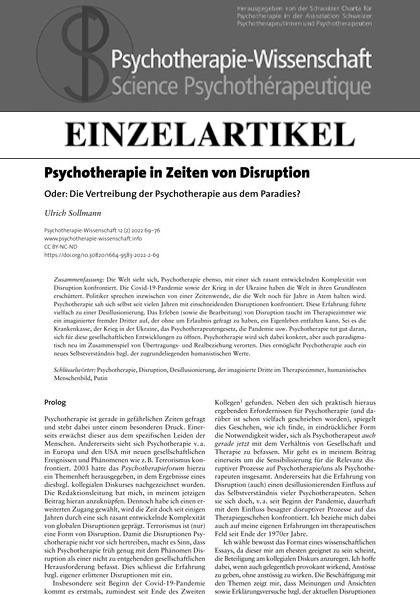Psychotherapy in times of disruption
Or: The expulsion of psychotherapy from paradise?
DOI:
https://doi.org/10.30820/1664-9583-2022-2-69Keywords:
psychotherapy, disruptio, disillusionment, the imagined stranger in the therapy room, humanistic concept of mankind, PutinAbstract
The world, and the field of psychotherapy, are facing a rapidly developing complexity of disruption. The Covid-19 pandemic and the war in Ukraine have shaken the world to its core. Politicians now talk of a historical turning point that will play a pivotal role for many years to come. The field of psychotherapy has been confronted with radical disruption over the years. These experiences often lead to disillusionment. The experience (and processing) of disruption appears in the therapy room like an imagined stranger who, without seeking permission, develops an existence of his own. Whether it be issues related to health insurance companies, the war in Ukraine, the psychotherapist law, the pandemic, etc., the field of psychotherapy would do well to open itself up to these societal developments. Psychotherapy would thereby concretely and paradigmatically re-position itself in the interaction between transference and real relationships. This would grant the field of psychotherapy a new understanding of the fundamental humanistic values.
Downloads
How to Cite
Sollmann, U. (2022). Psychotherapy in times of disruption: Or: The expulsion of psychotherapy from paradise?. Psychotherapie-Wissenschaft, 12(2), 69–76. https://doi.org/10.30820/1664-9583-2022-2-69
Issue
Section
Special Issue
License

This work is licensed under a Creative Commons Attribution-NonCommercial-NoDerivatives 3.0 Unported License.
This journal provides open access to its content in accordance with the basic premise that the free public availability of research benefits the exchange of knowledge throughout the world.
Authors wishing to publish in this journal agree to the following:
- The author/s retain/s the copyrights and consent/s to initial publication of the work in the journal under a Creative Commons Attribution licence, which allows third parties to use the work by citing the name/s of the author/s and this journal as initial publisher (in accordance with the Creative Commons Attribution-NonCommercial-NoDerivs 3.0 DE-Licence).
- The author/s can enter into additional contracts for the non-exclusive distribution (e.g. publish in a collection or book) of the version published in the journal, if the journal is cited as initial publisher.


